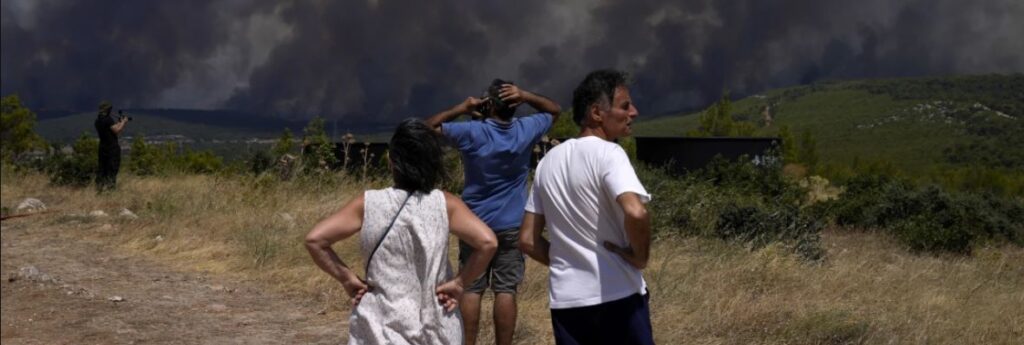Firefighting aircraft and ground crews from other countries headed to Greece on Thursday to help battle wildfires that have intensified as a heat wave baked much of southern Europe in temperatures above 40 degrees Celsius (104 degrees Fahrenheit).
New evacuations were ordered as wildfires raged near Athens, forcing thousands to flee from seaside resort towns. In a round-the-clock battle to preserve forests, industrial facilities and vacation homes, evacuations continued for a third day Thursday along a highway connecting the capital to the southern city of Corinth.
The fire has been raging since Tuesday and already burned 35 sq. m. of forest and scrubland.
Firefighting teams from Poland, Romania and Slovakia were due in Greece on Thursday, and Israel pledged to send two firefighting planes, adding to the four from Italy and France that were already operating outside Athens.
Southern Europe’s second heat wave in as many weeks has brought extreme temperatures to Mediterranean countries. Temperatures in southern Greece were expected to reach 44 C (111 F) by the end of the week.
The heat in Rome eased only slightly after a sweltering 42-43 C (107-109 F) on Tuesday, while highs in Sicily and Sardinia reached 46 C (114 F). Parts of Spain were as high as 45 C (113 F) on Wednesday.
Amador Cortes, a resident in the southern Spanish city of Jaen, said people were doing their best to avoid the sun during midday hours and the early afternoon.
“The truth is, they take shelter at home with the air conditioning, with the fan. In the street, the elderly suffer a lot. Anyway, we have to put up with it,” he said.
In the southern Turkish city of Adana, a group of residents handed out desserts in the street, and many paid tribute to the late U.S. engineer Willis Carrier, who invented the air conditioner in 1902.
“The people of Adana really need air conditioners. God bless him for making such an invention,” city resident Mehmet Saygin told Turkey’s DHA news agency.
The latest heat wave added to concerns about climate change. The World Meteorological Organization, a United Nations body, said preliminary global figures showed last month was the hottest June on record.
“The extreme weather, an increasingly frequent occurrence in our warming climate, is having a major impact on human health, ecosystems, economies, agriculture, energy and water supplies,” WMO Secretary-General Petteri Taalas said Wednesday.
“This underlines the increasing urgency of cutting greenhouse gas emissions as quickly and as deeply as possible.”

